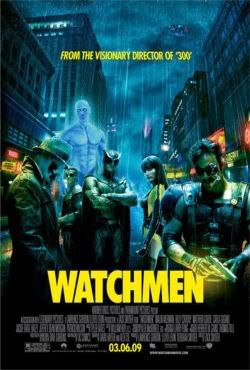 Come... dry your eyes. For you are life, rarer than a quark and unpredictable beyond the dreams of Heisenberg; the clay in which the forces that shape all things leave their fingerprints most clearly. -- Dr. Manhattan, Watchmen by Alan Moore.
Come... dry your eyes. For you are life, rarer than a quark and unpredictable beyond the dreams of Heisenberg; the clay in which the forces that shape all things leave their fingerprints most clearly. -- Dr. Manhattan, Watchmen by Alan Moore.So yeah, I've noticed. Watchmen the movie is not everyone's cup of tea. Some girls I overheard in the restroom noted: "It suuuuucked." Well, too bad for them. Coz I liked it! Is that entirely because I had read the graphic novel beforehand? Watchmen is considered a classic of its time, penned by the much adored Alan Moore. A few years ago when I started to read it I had already had a taste of Alan Moore's writing with From Hell -- hella of a place to start because egad, was that dense! A difficult read made only less so on account of my interest in the subject matter (Jack the Ripper). Thanks to that I was not put off by the first few chapters of Watchmen. Some who dismiss the novel as just another comic book hero story perhaps never get to that mindset where one can see beyond the artifice and the fantasy underneath which more philosophical issues are being asked. In an alternate universe where the United States is still in a cold war with Russia, where vigilantes, outlawed and now retired, live out painfully ordinary, sometimes miserable little lives, the one hero recognized by all is virtually a god, a naked blue figure called Dr. Manhattan, a seeming sword of Damocles hanging over the heads of the entire human race. What does this god think of mere mortals? What does it mean to love a god, to be loved by him? What about the heroes of the past, how do they look upon their lives, their history? Do they long for it still? Or have they moved past it? Where do heroes go to die? Why do they become heroes in the first place, is it nobility or power? Is it a matter of choice? Or are they driven to assume alternate personas because they are just as flawed and damaged as the rest of us? Whether any of these is true or not, if any one of them could save us, save humanity, is any solution a justifiable act?
The movie, as good as it was, was naturally confined to the limitations of its format. In the graphic novel, the characters are so excellently explored that you get a sense of each one's pains. One of the things I loved about it was Dr. Manhattan's musings on the human condition, his recounting of his own transition from humanity to virtual godhood. For all his unimaginable power, Dr. Manhattan still did not know everything, and still marvelled as he reached an insight concerning his former lover Laurie (The Silk Spectre). (My favorite quote at the start of this entry is from that very moment.) I could go on and on but it's been some time since I read the novel, and there are just too many themes, too many details that I have already forgotten. (So yeah, I'll read it again someday.)
So yeah, I loved the movie. But that's just me. I love science fiction and fantasy because I sometimes find the more realistic drama genre too oppressive. Science fiction and fantasy, in contrast, present to us a hyper reality if you will, something that Ursula K. Le Guin calls "a psychological reality in the novelist's way", an "invention of elaborately circumstantial lies" underneath which are universal truths. Le Guin also notes that those who do not like science fiction describe the genre as "escapist". And it is, but only if you do not go beyond the surface. Otherwise, you're liable to say, "It suuuuucks!".
The movie, as good as it was, was naturally confined to the limitations of its format. In the graphic novel, the characters are so excellently explored that you get a sense of each one's pains. One of the things I loved about it was Dr. Manhattan's musings on the human condition, his recounting of his own transition from humanity to virtual godhood. For all his unimaginable power, Dr. Manhattan still did not know everything, and still marvelled as he reached an insight concerning his former lover Laurie (The Silk Spectre). (My favorite quote at the start of this entry is from that very moment.) I could go on and on but it's been some time since I read the novel, and there are just too many themes, too many details that I have already forgotten. (So yeah, I'll read it again someday.)
So yeah, I loved the movie. But that's just me. I love science fiction and fantasy because I sometimes find the more realistic drama genre too oppressive. Science fiction and fantasy, in contrast, present to us a hyper reality if you will, something that Ursula K. Le Guin calls "a psychological reality in the novelist's way", an "invention of elaborately circumstantial lies" underneath which are universal truths. Le Guin also notes that those who do not like science fiction describe the genre as "escapist". And it is, but only if you do not go beyond the surface. Otherwise, you're liable to say, "It suuuuucks!".


No comments:
Post a Comment